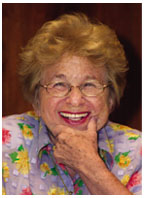
 April
23, 2003:
A
moment with...
April
23, 2003:
A
moment with...
Dr. Ruth
Photo by Frank Wojciechowski
To many of us she always will be Dr. Ruth, but to the 19 students in her course this semester, she is Dr. Westheimer, a visiting professor. Best known for her bubbly enthusiam and the frank advice on sexuality she offers on her radio show, Sexually Speaking, Ruth Westheimer has a different focus in her Princeton course, The Family in Jewish Tradition. It is a topic that has interested her for a lifetime: Sent on a train with other Jewish children from Germany to Switzerland in 1938 at age 10, Westheimer later learned that her parents were killed at Auschwitz and that her other close relatives also perished.
Last month, she spoke to a standing-room-only crowd at Dodds Auditorium about sexuality, answering anonymously submitted questions such as “What foods affect the sex drive?” (“I am not a nutritionist! But if you believe that black olives are an aphrodisiac, go out and buy some!”) and “How does the sex drive change as men age?” (“Older people should have sex in the morning – the testosterone level is higher.”) Here she speaks with Paw editor Marilyn Marks.
You lecture frequently at universities. Is it difficult to make the transition between academia and Sexually Speaking?
It takes work to go back and forth, but it’s not difficult. You have to remember that my doctorate is not in sex; it’s in the interdisciplinary study of the family. And wherever I have done Sexually Speaking, or given a talk on sexual literacy, I haven’t forgotten my academic background.
What do you most want students to learn from you?
I’m conscious of where I am teaching – in the Jewish studies program. If the students can walk away with the knowledge that the Jewish family is going to survive, then I have done my share. We talk about the pogroms, the Holocaust, about life on the kibbutz, about the Ethiopian immigrants and the Russian immigrants in Israel. And about issues of modern life in the U.S. One thing I can contribute is a combination of the academic world and my own experiences – and also this important belief in the zest for life, this joie de vivre that I certainly do have. Of course, I’m going to do one seminar on sexuality in the Jewish tradition – I did a book on that, Heavenly Sex.
You have this zest for life even though you experienced great tragedy. How have you maintained that attitude?
Yes; I lost everybody. I was in the kindertransport. We talked about the kindertransport in the class. We saw a movie about it, Into the Arms of Strangers. I brought a big box of Godiva chocolate. I said, “Today we are going to talk about such sad aspects that we have to sweeten that a little bit.”
I get asked this question about my zest for life a lot, and the answer is . . . well, I don’t have a complete answer, but definitely, my very early childhood years were wonderful. I do believe that early socialization is crucial. I was an only child, and I had one set of grandparents living on a farm where I spent all my holidays, and also had a very important grandmother living with us. The most important thing was that she had time for me. On Sundays she took me to a garden. I still remember the pastry I got there – I can taste it as I talk about it. A white fluffy pastry with whipped cream. It’s not that I am never sad. But I can compartmentalize.
It makes me very happy to be here at Princeton. You know, I try to take advantage of everything that Princeton has to offer. I had tea with [religion professor] John Gager and his wife. Fabulous! And he gave me very good advice. I said to him, “I’m a little apprehensive.” He said, “Just bring your passion.” And that was perfect advice! That’s what I’m doing.
In your autobiography, you discuss how you went to Palestine after the war and were trained as a sharpshooter in the Haganah [the Jewish underground military force]. You were injured – what happened?
In 1948, I was badly wounded in both legs, from shrapnel. But that’s not why I’m short! I would have been short anyway. The physicians were brilliant; they fixed me in such a way that I can dance. And I’m going skiing for a whole week.
What’s your latest project?
My newest book – it comes out October 1 – is Musically Speaking. It’s all about the songs and the music that accompanied me through life. The songs of my childhood. The music of Mozart. And also the songs of Israel – the songs that are a little bit sad but still give me support.
Are you surprised by the sexually explicit questions you are asked?
I’m not surprised. It pleases me that the vocabulary today is different
– that people are asking more specific questions. Listen, though;
I’m old-fashioned and a square. I speak explicitly, but my values,
my beliefs – I’m rather old-fashioned. Recently I was at the
University of Ottawa. My son [Joel Westheimer ’85] is a professor
of education there. He sat down, right in the front, and I started to
talk in my explicit way about sexual literacy. I looked at him, and I
stopped. I just couldn’t do it! I was blushing! I said, “Joel,
move!” And he moved, and then I could go on. ![]()
